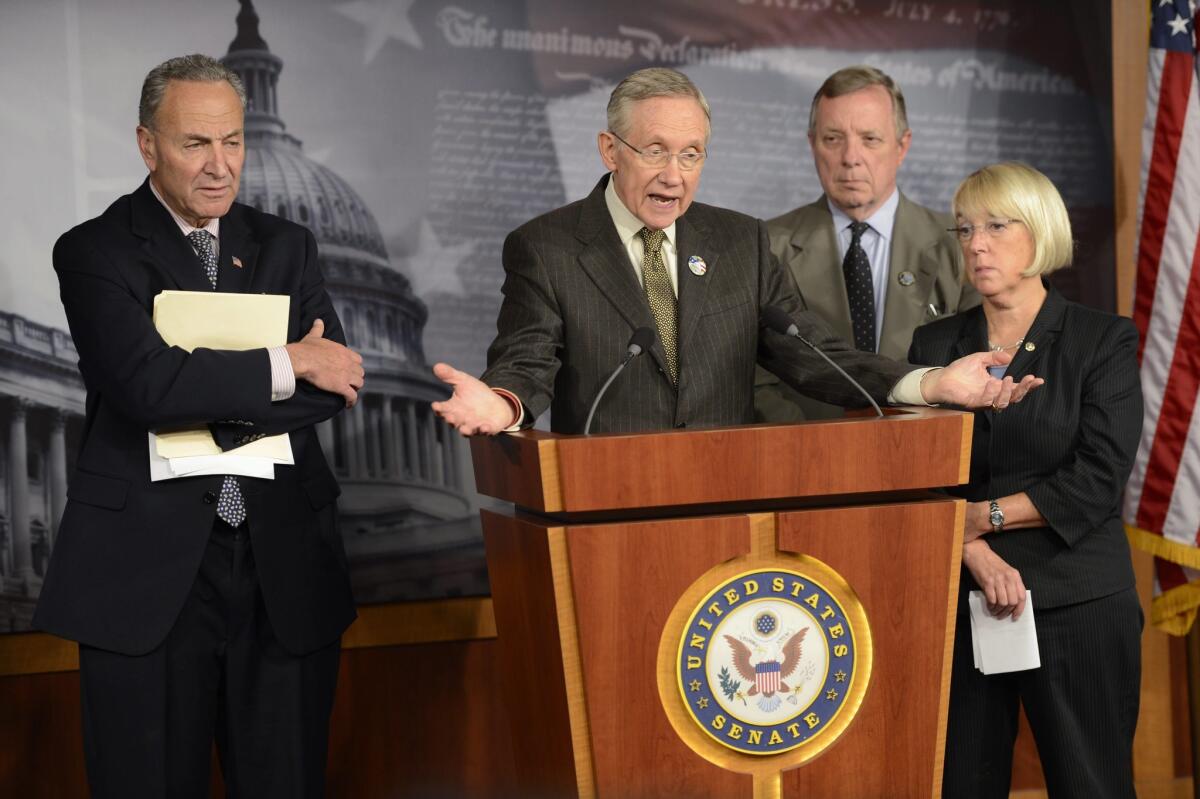GOP shutdown meme: Democrats hate people

Much of what happens in Congress isnât about governing or setting policy, itâs about creating campaign issues for the next election. Thatâs because the No. 1 item on the legislative agenda is determining whoâll get to set the legislative agenda.
As lamentable as that may be, thereâs a good reason for it. House rules give the majority tremendous power to stifle the minority. And in the Senate, the majority can wield absolute control over what gets debated and legislated, although the filibuster effectively gives the minority veto power over anything the majority tries to pass.
Anyway, the House GOP has spent the last three days not trying to end the partial government shutdown that began Tuesday but trying to make Democrats look like ogres. Theyâve passed a series of narrow bills to temporarily fund specific, popular federal efforts -- for example, ensuring food and drug safety, conducting medical research and operating national monuments -- and blasted Democrats for opposing them.
For example, not long after the House passed a bill to reopen the National Institutes of Health until mid-December, the campaign arm of the House GOP sent out a press release trumpeting the ânoâ vote by Rep. Julia Brownley (D-Westlake Village) headlined, âBrownley Votes Against Funding for Cancer Patients.â One can only imagine the 30-second ads that weâll see during next yearâs campaign.
Senate Majority Leader Harry Reid (D-Nev.) has refused to take up the rifle-shot funding bills that are piling up in the Senate, exposing him to questions like this one from CNNâs Dana Bash, referring to the House GOPâs mini-funding bill for the National Institutes of Health: âIf you can help one child with cancer, why wouldnât you do it?â Reidâs explanation for the Senateâs refusal to take up such bills -- âWhat right did they [House Republicans] have to pick and choose what part of governmentâs going to be funded?â -- came across as legalistic and heartless.
Regardless, the White House has said President Obama will veto the piecemeal bills if they somehow reach his desk. His stance and Reidâs have led Republicans to accuse Democrats of stonewalling, and theyâve repeatedly asked why the Senate wonât negotiate over a temporary funding bill. Democrats respond that Republicans are engaged in a âcynical deception,â as Rep. David Price (D-N.C.) put it Friday, and note that the House GOP refused to negotiate a budget agreement that could have averted the current impasse.
On Friday, the House took up a mini-continuing resolution that would temporarily fund the Federal Emergency Management -- a hot topic with Tropical Storm Karen bearing down on the Gulf Coast. Once again, Democrats found themselves in the uncomfortable position of trying to explain that they didnât oppose a valuable federal program, they just opposed funding it all by its lonesome. Noting that the Small Business Administration, the U.S. Geological Survey, the National Resources Conservation Service and other federal agencies involved in disaster response wouldnât be funded, Rep. Jim Moran (D-Va.) said: âThey need to work as a team, but here we are.... The fact is, the whole federal government needs to be put back to work.â
Regardless of the merits of arguments like Moranâs, theyâre not as compelling politically as âBrownley Votes Against Funding for Cancer Patients.â Nor have Democrats found a way to force Republicans to cast a vote anywhere near that tough during the current shutdown. Theyâve tried a succession of procedural maneuvers to force an up-or-down vote on the Senateâs proposed stopgap funding bill, which a small but growing number of disaffected House Republicans have said they would support, but none has worked.
And so the bickering and finger-pointing continues. Right after voting on the FEMA bill, the House took up a similar measure for the Women, Infants and Children supplemental nutrition program. It was ironic to see House Republicans stand up to defend WIC, Rep. Rosa DeLauro (D-Conn.) said, given that theyâve voted to cut the program three years in a row, denying aid to hundreds of thousands of low-income Americans.
The heart of the dispute hasnât changed -- House Republicans wonât agree to reopen the government unless the 2010 healthcare law is delayed or rolled back, which Democrats wonât do -- but lawmakers are hardly talking about that anymore. Now itâs just a succession of votes designed to make Democrats squirm, while obscuring the reason the government shut down in the first place.
ALSO:
Donât wait on the debt limit
Obama is ducking a leaderâs duty
The real story behind all those Obamacare waivers
Follow Jon Healey on Twitter @jcahealey and Google+
More to Read
A cure for the common opinion
Get thought-provoking perspectives with our weekly newsletter.
You may occasionally receive promotional content from the Los Angeles Times.











